What is the fear of injections? Pathological fear of pricking, called "trypanophobia", is observed in both adults and children.
Yes, there are hardly any people who say with certainty that they love injections, but trypanophobia is radically different from the slight psychological discomfort that almost everyone experienced during and during medical procedures.
But trypanophobes seek by all means avoid that scares them, and in some cases may refuse the necessary therapeutic and diagnostic measures.
Trypanophobia Varieties
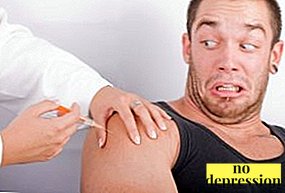
Trypanophobia is divided into the following subspecies:
- Fear of skin piercing with a needle of a syringe. In a tripanophobe, a panic attack can start from scrolling in the head of the procedure, from viewing pictures and videos showing the process of inserting a needle into the skin. Such a person can even escape from the office, where they take blood for analysis or put injections.
- Fear of syringes and needles from themincluding photos and videos with them.
- Fear of air bubbles that can enter the vessel and cause an air embolism. Some uninformed trypanophobes may start to panic because of air bubbles in the IV bag, although this fear is completely unfounded: the air from the bag cannot physically get into the vein.
- Fear of the physical consequences of injections: bumps, bruises and even an abscess due to a medical specialist's mistake.
- Fear that the needle of the syringe will break during the procedure and remain in the body. Because of fear, the likelihood that this will happen, even increases slightly: the patient involuntarily strains the muscles during intramuscular injection, moves, which causes this, especially if the needle is of poor quality, and the procedure is performed by an incompetent specialist.
 Fear of getting dangerous infectious diseases by blood contact: through a non-sterile needle. In most medical institutions, syringes are not reused and the packaging is opened with them in the patient, so the probability of getting the disease is low.
Fear of getting dangerous infectious diseases by blood contact: through a non-sterile needle. In most medical institutions, syringes are not reused and the packaging is opened with them in the patient, so the probability of getting the disease is low.
And in order for air trapped in a vessel through a syringe to really harm, it must be introduced in large quantities - at least 150-200 milliliters - and the vessel itself must be large.
All these fears or some of them may be present in trypanophobes. They also often have other phobias associated with medical procedures, diseases and doctors.
Injections and risk embolism. Air in the syringe - how dangerous it is:
Causes of fear
Factors affecting the development of phobias:
- Bullying in childhood. Parents often use bullying to control their children’s behavior. “If you don’t obey, we’ll give you to that aunt,” “Why do we need such a naughty child? Tomorrow we'll take you to boarding school ”and much more. And in fact, this is an extremely dangerous effect on the child's psyche, which can later form the basis of many mental disorders. Intimidation often refers to the fact that children are so often afraid - doctors, bitter pills, injections, droppers - and exacerbate these fears.
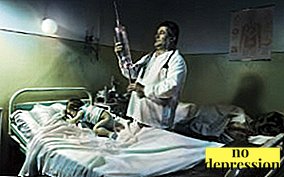 Negative experience: post-injection complications (bumps, bruises, abscesses), long-term treatment of a serious illness, accompanied by regular administration of drugs with syringes and droppers (in this case, negative, anxious feelings from the disease can affect the development of phobia), marked deterioration of health after injection or blood sampling for analysis. Often, a phobia develops not because of the inexperience of the medical staff, but because of the mistakes made by close people when administering the drug themselves, which led to serious consequences.
Negative experience: post-injection complications (bumps, bruises, abscesses), long-term treatment of a serious illness, accompanied by regular administration of drugs with syringes and droppers (in this case, negative, anxious feelings from the disease can affect the development of phobia), marked deterioration of health after injection or blood sampling for analysis. Often, a phobia develops not because of the inexperience of the medical staff, but because of the mistakes made by close people when administering the drug themselves, which led to serious consequences.- Poor quality syringes with thick needles, which were used several decades ago and caused pronounced discomfort, so fear of them may persist among people who caught that period.
- Personality Features. Impressive, sensitive, suggestible children and adults are more likely to suffer from various phobias, since it is much easier to scare them. A phobia can cause a transfer to a medical theme, a shocking article in a newspaper or on the Internet, a story of a loved one.
- Social reasons. Far from all people receive quality medical care, and medical workers, even those with diplomas, may render it incorrectly, and the procedures that they perform often leave behind complications. In some countries of the world, medical care is in principle inaccessible, and medical manipulations are performed by random people who can do harm.
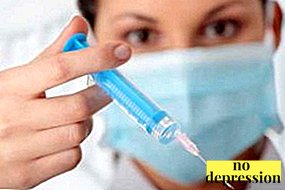 Emotional shocks. People who are in a difficult situation, survived the death of loved ones, violence and other serious events with mental disorders (depression, neurosis, hypochondria, obsessive-compulsive disorder, anxiety disorder) are more likely to have new phobias, including pathological fear. injections.
Emotional shocks. People who are in a difficult situation, survived the death of loved ones, violence and other serious events with mental disorders (depression, neurosis, hypochondria, obsessive-compulsive disorder, anxiety disorder) are more likely to have new phobias, including pathological fear. injections.
Often the phobia has no rationale and is based on false or exaggerated information.
Phobia is usually associated not with one, but with several reasons at once.
Symptoms and signs
Psycho-emotional symptoms (usually occur when a person finds out that he needs to undergo a medical procedure):
- Sleep disturbance: insomnia, frequent waking, shallow, unstable sleep, nightmares, which additionally aggravates the mental state of a person.
- The general feeling of anxiety, inability to concentrate on the usual things. A person may look nervous, he has nervous tics, and the obsessive thoughts associated with the procedure do not give him the opportunity to fully relax.
- Scrolling in the head of images associated with the injection. This scrolling is almost involuntary, therefore it is difficult for a person to control it. Images can be associated with negative experiences (there is a fear of complications after an injection), with blood and all that causes fear in a person (for example, fantasies about what happens if an air bubble enters the vein). In some cases, such images can cause a panic attack.
 Changes in the emotional background. The mood of trypanophobe deteriorates significantly, it can become irritable, tearful, withdraw into itself.
Changes in the emotional background. The mood of trypanophobe deteriorates significantly, it can become irritable, tearful, withdraw into itself.
Anxiety smoothly grows as the time of the procedure approaches and reaches a peak when a person enters the office.
The severity of symptoms depends on the characteristics of the phobia and the individual characteristics of the person.
If the phobia is very pronounced, psycho-emotional symptoms are always associated. vegetative:
- throws a person into heat or cold;
- his pulse quickens;
- if he has cardiovascular diseases, if he comes in contact with what scares, they become aggravated (an attack of stenocardia, arrhythmia, tachycardia may occur);
- blood pressure may drop or rise;
- limbs begin to tremble;
- nausea and vomiting may occur;
- there is a feeling of weakness;
- there is a feeling of lack of air, suffocation;
- in rare cases, the patient may faint.
Usually the autonomic symptoms are observed in people already in the treatment room when the fear reaches a peak.
How strong people may be afraid of injections:
Treatment
What if you are afraid of injections? Ways to fight phobia:
 Discuss a phobia with a doctor. If the attending physician is sane and understanding, he will try to gently reassure the patient and suggest options that may suit him, for example, refer to a specific medical professional who is able to make very good injections. Also, the conversation will remove excess stress and help internally prepare for the procedure.
Discuss a phobia with a doctor. If the attending physician is sane and understanding, he will try to gently reassure the patient and suggest options that may suit him, for example, refer to a specific medical professional who is able to make very good injections. Also, the conversation will remove excess stress and help internally prepare for the procedure.- Drink a drug with an anesthetic effect.which will help to muffle discomfort during the procedure.
- Take a sedative before the procedure. Valeriana tablets, Novo-Passit, decoctions based on soothing herbs and other means will do. You can start drinking them immediately after the person has learned that he has to go through the procedure in order to reduce anxiety, improve concentration and avoid problems with sleep.
- Choose a comfortable posture. If you lie with your feet slightly raised during the procedure, this will avoid some of the autonomic symptoms.
- Perform breathing exercises. They can be held before or even during the procedure to cope with anxiety. You need to close your eyes and take a deep breath. After that, you need to count to five and exhale slowly.
- Do not observe what the medical professional is doing. Turn away, look aside or in a window, put on earphones in advance and turn on music, consider a picture in phone.
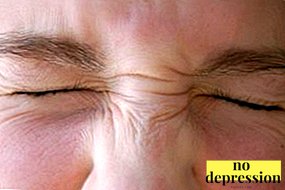 Come up with a reward. You can think of a reward for passing a frightening procedure, such as a delicacy, visiting an interesting event, buying a book. This will allow you to concentrate on something good and reduce fear.
Come up with a reward. You can think of a reward for passing a frightening procedure, such as a delicacy, visiting an interesting event, buying a book. This will allow you to concentrate on something good and reduce fear.- Calm with an account. Mentally count to ten and back. This should be done slowly.
It is necessary to inform the medical worker about fear in a polite and trustful manner and say in which position the manifestations of fear will be weaker.
For some people, the fear of injections is so strong that they may need psychotherapeutic help. A psychotherapist will help you find the best ways to overcome fear.
How to stop being afraid of injections and inject properly? Find out from the video:
How to help a child who is afraid of a syringe?
Most children are afraid of injections even more than adults, so parents should treat your child's fear with understanding, avoid mocking jokes on this topic.
Methods of dealing with phobia:
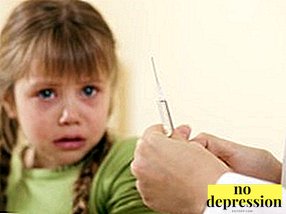 Notify in advance a child that he will soon be given an injection or blood will be taken for analysis. Remind him of why this is necessary, and if the child is old enough, you can tell him in an accessible way about diseases, tests and injections.
Notify in advance a child that he will soon be given an injection or blood will be taken for analysis. Remind him of why this is necessary, and if the child is old enough, you can tell him in an accessible way about diseases, tests and injections.- Avoid lying. It is important to honestly warn the child that the procedure may seem painful to him, but do not exaggerate. It is also important to avoid any intimidation that can cause a child's fear of medical professionals and their attributes.
- To better prepare the child psychologically to the procedure, you can play the role-playing game “Hospital”, during which you can demonstrate what is happening in the office and how the nurse puts a shot or takes blood.
Trypanophobia in most cases does not require special treatment it is enough to find a method that will reduce fear. If a close person has such a phobia, this should be treated with understanding and tell about ways that will help a person to cope with it.
The child is afraid of injections. How to remove this fear? Psychologist tips:

 Fear of getting dangerous infectious diseases by blood contact: through a non-sterile needle. In most medical institutions, syringes are not reused and the packaging is opened with them in the patient, so the probability of getting the disease is low.
Fear of getting dangerous infectious diseases by blood contact: through a non-sterile needle. In most medical institutions, syringes are not reused and the packaging is opened with them in the patient, so the probability of getting the disease is low. Negative experience: post-injection complications (bumps, bruises, abscesses), long-term treatment of a serious illness, accompanied by regular administration of drugs with syringes and droppers (in this case, negative, anxious feelings from the disease can affect the development of phobia), marked deterioration of health after injection or blood sampling for analysis. Often, a phobia develops not because of the inexperience of the medical staff, but because of the mistakes made by close people when administering the drug themselves, which led to serious consequences.
Negative experience: post-injection complications (bumps, bruises, abscesses), long-term treatment of a serious illness, accompanied by regular administration of drugs with syringes and droppers (in this case, negative, anxious feelings from the disease can affect the development of phobia), marked deterioration of health after injection or blood sampling for analysis. Often, a phobia develops not because of the inexperience of the medical staff, but because of the mistakes made by close people when administering the drug themselves, which led to serious consequences. Emotional shocks. People who are in a difficult situation, survived the death of loved ones, violence and other serious events with mental disorders (depression, neurosis, hypochondria, obsessive-compulsive disorder, anxiety disorder) are more likely to have new phobias, including pathological fear. injections.
Emotional shocks. People who are in a difficult situation, survived the death of loved ones, violence and other serious events with mental disorders (depression, neurosis, hypochondria, obsessive-compulsive disorder, anxiety disorder) are more likely to have new phobias, including pathological fear. injections. Changes in the emotional background. The mood of trypanophobe deteriorates significantly, it can become irritable, tearful, withdraw into itself.
Changes in the emotional background. The mood of trypanophobe deteriorates significantly, it can become irritable, tearful, withdraw into itself. Discuss a phobia with a doctor. If the attending physician is sane and understanding, he will try to gently reassure the patient and suggest options that may suit him, for example, refer to a specific medical professional who is able to make very good injections. Also, the conversation will remove excess stress and help internally prepare for the procedure.
Discuss a phobia with a doctor. If the attending physician is sane and understanding, he will try to gently reassure the patient and suggest options that may suit him, for example, refer to a specific medical professional who is able to make very good injections. Also, the conversation will remove excess stress and help internally prepare for the procedure. Come up with a reward. You can think of a reward for passing a frightening procedure, such as a delicacy, visiting an interesting event, buying a book. This will allow you to concentrate on something good and reduce fear.
Come up with a reward. You can think of a reward for passing a frightening procedure, such as a delicacy, visiting an interesting event, buying a book. This will allow you to concentrate on something good and reduce fear. Notify in advance a child that he will soon be given an injection or blood will be taken for analysis. Remind him of why this is necessary, and if the child is old enough, you can tell him in an accessible way about diseases, tests and injections.
Notify in advance a child that he will soon be given an injection or blood will be taken for analysis. Remind him of why this is necessary, and if the child is old enough, you can tell him in an accessible way about diseases, tests and injections.

